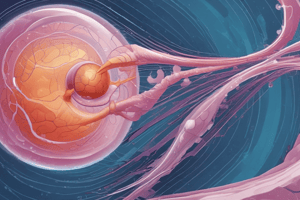Podcast
Questions and Answers
The number of nuclei present in a zygote is...
The number of nuclei present in a zygote is...
- two
- four
- one (correct)
- eight
Which of these is the male reproductive organ in humans?
Which of these is the male reproductive organ in humans?
- testes (correct)
- ovary
- sperm
- seminal fluid
Attachment of the embryo to the wall of the uterus is known as...
Attachment of the embryo to the wall of the uterus is known as...
- fertilization
- gestation
- cleavage
- implantation (correct)
Rupturing of follicles and discharge of ova is known as...
Rupturing of follicles and discharge of ova is known as...
In human females, the fertilized egg gets implanted in the uterus...
In human females, the fertilized egg gets implanted in the uterus...
The test tube baby technique is called...
The test tube baby technique is called...
Presence of beard in boys is classified as a...
Presence of beard in boys is classified as a...
The disc-like structure that helps in the transfer of substances to and from the foetus's body is called _____?
The disc-like structure that helps in the transfer of substances to and from the foetus's body is called _____?
The hormone produced by the testis is _____?
The hormone produced by the testis is _____?
Where does fertilization occur in the female reproductive system?
Where does fertilization occur in the female reproductive system?
Flashcards
Fertilization
Fertilization
The union of a male sperm and a female egg.
Blastula
Blastula
The stage of development in which a fertilized egg (zygote) divides and develops into a ball of cells, forming a hollow sphere.
Gastrula
Gastrula
The stage of development in which the blastula undergoes further cell division and differentiation, forming specialized tissues and layers.
Implantation
Implantation
Signup and view all the flashcards
Foetus
Foetus
Signup and view all the flashcards
Gestation
Gestation
Signup and view all the flashcards
Parturition
Parturition
Signup and view all the flashcards
Colostrum
Colostrum
Signup and view all the flashcards
Study Notes
Multiple Choice Questions
- The number of nuclei in a zygote is two
- The male reproductive organ in humans is the testes
- Attachment of the embryo to the uterine wall is called implantation
- Rupturing of follicles and releasing the ovum is called ovulation
- Fertilized egg implants in the uterus after about 7 days
- Test-tube baby technique is in vitro fertilization
- The acrosome is part D of the sperm
Answer in One Sentence
- A fetus is a developing embryo with more developed features.
- Sperm travels through the testis, epididymis, vas deferens, and urethra to reach the exterior.
- Glands like the seminal vesicles, prostate, and bulbourethral glands provide fluids for semen.
- Endocrine glands like the testes and adrenal glands help maintain sexual characteristics in males.
- Fertilization occurs in the fallopian tube and implantation occurs in the uterus.
- The external female genital organs include the ovaries, fallopian tubes, uterus, vagina, and vulva.
- Blastula is a hollow ball of cells; gastrula is a multilayered structure.
- A zygote is a fertilized egg, the embryo is the subsequent developing stage.
Fill in the Blanks
- The primary sex organ in the male is the testis.
- The uterus is also called the womb.
- Sperm fertilizes the ovum in the fallopian tube.
- The structure facilitating substance transfer to/from the fetus is the disc-like placenta.
- Gonorrhea is caused by bacteria.
- Testosterone is the hormone produced by the testes.
Short Answer Questions
- Budding in Hydra involves outgrowth and separation of new individuals.
- Sponges reproduce through fragmentation and budding.
- In vitro fertilization (IVF) involves fertilization outside the body.
- Mechanical contraceptives include condoms and diaphragms
- Tubectomy is a female sterilization procedure.
- The causal organism of syphilis is Treponema pallidum. Symptoms include sores, rash, and neurological problems.
- Colostrum is the initial milk produced after childbirth, rich in antibodies.
Long Answer Questions
- Diagrams and details are needed for male and female reproductive systems.
- Detailed description of the female reproductive system, including organs (ovaries, fallopian tubes, uterus, vagina) is required.
- The function of each part should be detailed.
- The process of fertilization, including the meeting of egg and sperm.
- Details describing how the zygote develops into a morula.
Studying That Suits You
Use AI to generate personalized quizzes and flashcards to suit your learning preferences.




